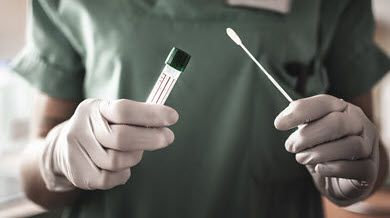There are three categories of testing.
NAATs, such as PCR-based tests, are most often performed in a laboratory. They are typically the most reliable tests for people with or without symptoms. These tests detect viral genetic material, which may stay in your body for up to 90 days after you test positive. Therefore, you should not use a NAAT if you have tested positive in the last 90 days.
Antigen tests are rapid tests that produce results in 15-30 minutes. They are less reliable than NAATs, especially for people who don't have symptoms. A single negative antigen test result does not rule out infection. To best detect infection, a negative antigen test should be repeated at least 48 hours apart (known as serial testing). Sometimes a follow-up NAAT may be recommended to confirm an antigen test result.
Antibody tests should not be used to diagnose a current infection with the virus that causes COVID-19. An antibody test may not show if you have a current infection, because it can take 1 to 3 weeks after the infection for your body to make antibodies.
Self-tests, or at-home tests, are usually antigen tests that can be taken anywhere without having to go to a specific testing site. Follow industry standards and manufacturer's instructions, including the number of times you need.
As a leading chemical supplier, we are committed to providing researchers with the reagents and technical expertise for timely support of the Covid-19 outbreak. We can provide as many reagents and medicines as possible for COVID-19 testing kits or testing methods and technologies.
